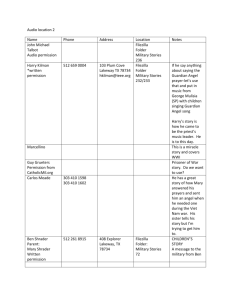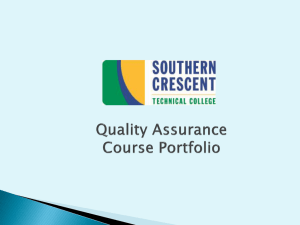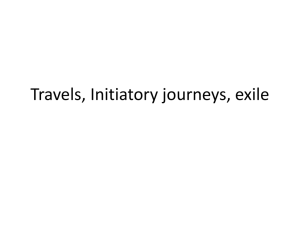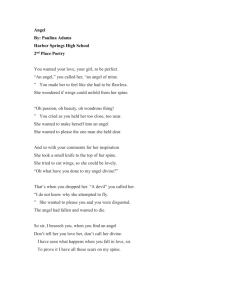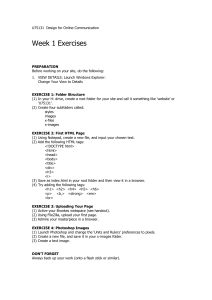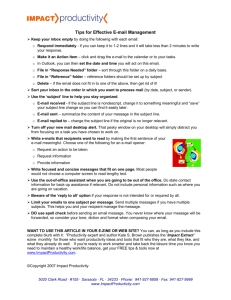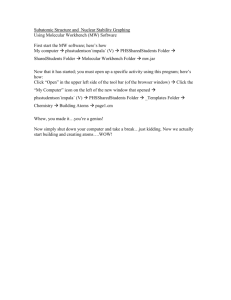EAP 1620 Course Syllabus - Miami-Dade College
advertisement
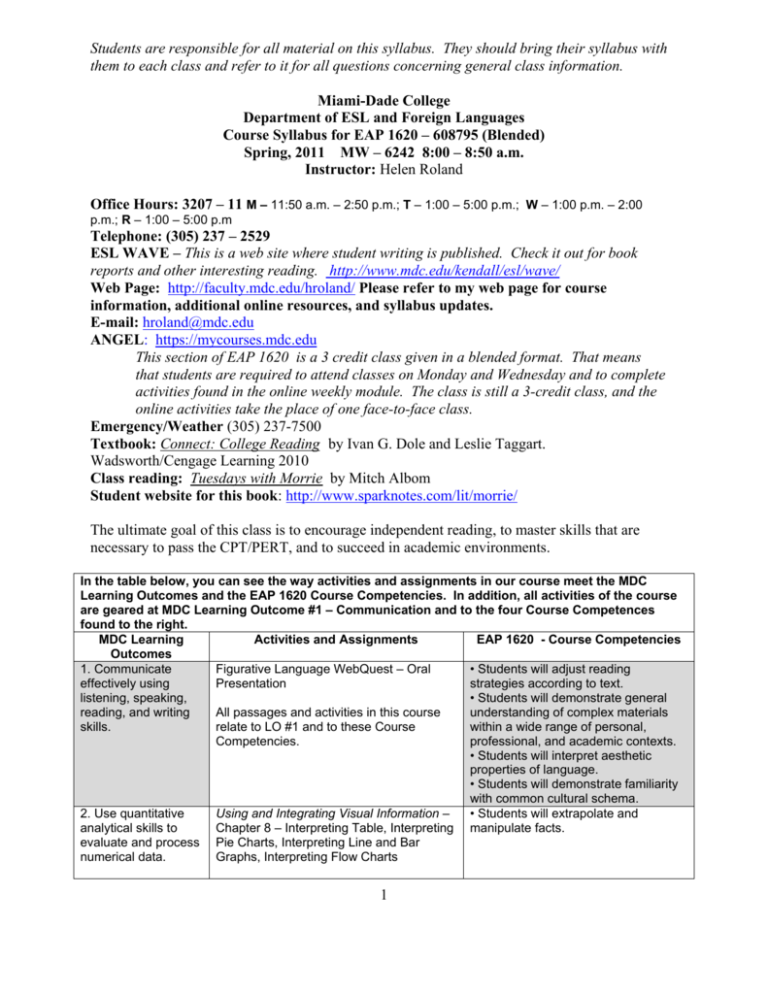
Students are responsible for all material on this syllabus. They should bring their syllabus with them to each class and refer to it for all questions concerning general class information. Miami-Dade College Department of ESL and Foreign Languages Course Syllabus for EAP 1620 – 608795 (Blended) Spring, 2011 MW – 6242 8:00 – 8:50 a.m. Instructor: Helen Roland Office Hours: 3207 – 11 M – 11:50 a.m. – 2:50 p.m.; T – 1:00 – 5:00 p.m.; W – 1:00 p.m. – 2:00 p.m.; R – 1:00 – 5:00 p.m Telephone: (305) 237 – 2529 ESL WAVE – This is a web site where student writing is published. Check it out for book reports and other interesting reading. http://www.mdc.edu/kendall/esl/wave/ Web Page: http://faculty.mdc.edu/hroland/ Please refer to my web page for course information, additional online resources, and syllabus updates. E-mail: hroland@mdc.edu ANGEL: https://mycourses.mdc.edu This section of EAP 1620 is a 3 credit class given in a blended format. That means that students are required to attend classes on Monday and Wednesday and to complete activities found in the online weekly module. The class is still a 3-credit class, and the online activities take the place of one face-to-face class. Emergency/Weather (305) 237-7500 Textbook: Connect: College Reading by Ivan G. Dole and Leslie Taggart. Wadsworth/Cengage Learning 2010 Class reading: Tuesdays with Morrie by Mitch Albom Student website for this book: http://www.sparknotes.com/lit/morrie/ The ultimate goal of this class is to encourage independent reading, to master skills that are necessary to pass the CPT/PERT, and to succeed in academic environments. In the table below, you can see the way activities and assignments in our course meet the MDC Learning Outcomes and the EAP 1620 Course Competencies. In addition, all activities of the course are geared at MDC Learning Outcome #1 – Communication and to the four Course Competences found to the right. MDC Learning Activities and Assignments EAP 1620 - Course Competencies Outcomes 1. Communicate Figurative Language WebQuest – Oral • Students will adjust reading effectively using Presentation strategies according to text. listening, speaking, • Students will demonstrate general reading, and writing All passages and activities in this course understanding of complex materials skills. relate to LO #1 and to these Course within a wide range of personal, Competencies. professional, and academic contexts. • Students will interpret aesthetic properties of language. • Students will demonstrate familiarity with common cultural schema. 2. Use quantitative Using and Integrating Visual Information – • Students will extrapolate and analytical skills to Chapter 8 – Interpreting Table, Interpreting manipulate facts. evaluate and process Pie Charts, Interpreting Line and Bar numerical data. Graphs, Interpreting Flow Charts 1 3. Solve problems using critical and creative thinking and scientific reasoning. Many of the passages of the text use the above examples of visual information. The text teaches students to use Bloom’s Taxonomy and has exercises for each passage labeled Critical Thinking Levels 16. 4. Formulate strategies to locate, evaluate, and apply information. Figurative Language WebQuest – Oral Presentation 5. Demonstrate knowledge of diverse cultures, including global and historical perspectives. 6. Create strategies that can be used to fulfill personal, civic, and social responsibilities. Cultural References Project 7. Demonstrate knowledge of ethical thinking and its application to issues in society. Dark Bargains of the Global Economy Chapter 6 Cultural References Project • Students will distinguish facts from opinions. • Students will evaluate the credibility and argumentation of a text. • Students will infer hypotheses. • Students will demonstrate general understanding of complex materials within a wide range of personal, professional, and academic contexts. • Students will demonstrate familiarity with common cultural schema. Amid Was, Passion for TV Chefs, Soaps and Idols Free Rice Scavenger Hunt activity Free Rice for Vocabulary Learning – www.freerice.com Fashion Industry Grapples with Designer Knockoffs Immigrants Work on as Bill Dies • Students will demonstrate general understanding of complex materials within a wide range of personal, professional, and academic contexts. • Students will explain and justify an opinion in reaction to authentic reading materials. • Students will evaluate the credibility and argumentation of a text. • Students will distinguish facts from opinions. New Immigration 8. Use computer and emerging technologies effectively. Figurative Language WebQuest – Power Point • Students will interpret aesthetic properties of language. Blended Class – uses ANGEL and accompanying LMS tools, All assignments must be submitted as Word documents. •Students will adjust reading strategies according to text. Reading Plus – www.readingplus.com Required online reading practice 9. Demonstrate an appreciation for aesthetics and creative activities. http://abcnews.go.com/GMA/story?id=3693 869&page=1 http://www.basisdesign.com/2010/06/marla -olmstead-paintings-my-kid-could-paintthat/ 10. Describe how natural systems Evaluating the Author’s Reasoning and Evidence - Chapter 11 2 • Students will distinguish facts from opinions. • Students will explain and justify an opinion in reaction to authentic reading materials. • Students will evaluate the credibility and argumentation of a text. function and recognize the impact of humans on the environment. excerpts from An Inconvenient Truth Are Man-Made Carbon Emissions Driving Climate Change Polar Bears: Today’s Canaries in the Coal Mine? • Students will distinguish facts from opinions. • Students will explain and justify an opinion in reaction to authentic reading materials. Week 1 (January 3 - 7 ) Introduction Week #1 Folder in ANGEL ***Please have your textbook by Monday, January 10. Week 2 (January 10 - 14) Newspaper Assignment – You must bring in the Sunday morning edition of the Miami Herald. Read & Respond for Week #2 Week #2 Folder in ANGEL Week 3 (January 17 - 21) ***No Classes – Monday, January 17 – Dr. Martin Luther King Day Read & Respond for Week #3 Week #3 Folder in ANGEL Week 4 (January 24-28) Assignment – Figurative Language WebQuest Project Read & Respond for Week #4 Test #1 - GRADE RECORD: ______ Week #4 Folder in ANGEL Week 5 (January 31 – February 4) Figurative Language WebQuest Project Presentations Read & Respond for Week #5 Week #5 Folder in ANGEL Week 6 (February 7 –11) Read & Respond for Week #6 Week #6 Folder in ANGEL Week 7 (February 14 - 18) Read & Respond for Week #7 Test #2 - GRADE RECORD: ______ Week #7 Folder in ANGEL Week 8 (February 21 - 25) ***No Classes – Monday, February 21 – Presidents’ Day Read & Respond for Week #8 Week #8 Folder in ANGEL Week 9 (February 28 – March 4) Read & Respond for Week #9 Week #9 Folder in ANGEL Week 10 (March 7 - 11) Read & Respond for Week #10 Test #3 - GRADE RECORD: ______ Week #10 Folder in ANGEL 3 Week 11 (March 14 - 18) Read & Respond for Week #11 Week #11 Folder in ANGEL Week 12 (March 21 - 25) Read & Respond for Week #12 Week #12 Folder in ANGEL Week 13 (March 28 – April 1) Read & Respond for Week #13 Test #4 - GRADE RECORD: ______ Week #13 Folder in ANGEL Week 14 (April 4 -8) Read & Respond for Week #14 Week #14 Folder in ANGEL Week 15 (April 11 - 15) Read & Respond for Week #15 Week #15 Folder in ANGEL Week 16 (April 18 - 22) ***No Classes – Friday, April 22 – Spring Break Week 17 (April 25 - 29) Final Exam Week – No classes. Only Exams. Final Exam Wednesday, April 27 – 8:00 a.m. – 9:30 a.m. TBA GRADING: Participation ................................................................................................................ 30 points. The participation grade will include Weekly Online Modules including Tuesdays with Morrie Introduction Folder/Discussion Boards. Figurative Language Project ……………………………………………………….. 5 points. Service Learning Project …………………………………………………...……….. 10 points. Tests .........................................................................................................................….. 40 points. Final Exam .................................................................................................................... 15 points. Name and Telephone # of 2 classmates: 1. ___________________________ _______________________ 2. ___________________________ _______________________ Letter Grades correspond to numerical scores as follows: 90-100 A S+ (Excellent) 80-89 B S (Satisfactory, Good) 70-79 C S(Fair) Below 70 F U (Unsatisfactory, Failing) Attitude: Attitude is everything! Have you heard that phrase? It’s absolutely true. The appropriate attitude for this class includes the following characteristics: interested, attentive, 4 positive, sharing, and tolerant. Making sure that your attitude matches the goals of the class will help you succeed in any higher level learning environment. Required Classroom Materials: Each student should have his/her own notebooks, binders, paper, pens, pencils, erasers, etc. Students will not be permitted to borrow from other students for tests, evaluations, etc. Each student should keep his/her materials for the course in a separate folder and be able to access it quickly in each class. Language Use in the Classroom: Students in EAP classes come from many different countries and speak many different languages. Out of respect for language differences of all students and because of the need to practice English in order to reach high levels of English proficiency, English is the language of this classroom. All classes are given in English. Students in this program are studying English for Academic Purposes which indicates that students are trying to reach a high level of language proficiency in English. Students in this class are expected to speak English in the class and to speak to the professor in English as much as possible. *Exceptions may be made after class when speaking privately to the professor. Attendance Policy: Weekly attendance and participation is mandatory. In the event of an absence, the student should communicate the reason for his/her absence to the professor in writing (note or email) and collaborate with other students to obtain discussion information, notes, or assignments. If a student is absent, he/she is still responsible for all material given through lectures, assignments, on ANGEL, in the labs, etc. The student is still required to take any upcoming test or evaluation on the date given. Emergency situations should be documented by signed official certificates. More than 3 absences (excused or unexcused) may result in an instructor drop. Tardy Policy: Students who arrive to class late disrupt both the professor and other students. We all deal with heavy traffic and emergencies. Please make sure that you plan for unexpected delays. Start early. You know that parking is limited and that you will have a problem finding a space to park. If you arrive late to class, enter the classroom silently, and do not bother other students by asking what we are doing. Cell Phones: Cell phones are very convenient and are part of modern life; however, there is a time and a place for everything. The classroom is not the time nor the place for cell phones. Make sure your phone is turned to silent during class. If you receive a call that is urgent, please leave the classroom, and do not interrupt the class. Honor Code: Academic honesty should be a part of each student's personal integrity. Each student is expected to abide by the college's honor code which strictly prohibits cheating, plagiarism, and other forms of academic misconduct. Students who are caught exhibiting any form of academic misconduct will receive an F on the assignment/test/project and will be subject to review by the college administration. Americans with Disabilities Act (ADA) Statement: Students who have a disability that might affect their performance in the class are encouraged to contact Access Services, in confidence, as soon as possible. The office will aid in appropriate accommodations for the student. This is in accordance with Section 504 of the Rehabilitation Act of 1973 and the American with 5 Disabilities Act of 1990. Please inform me during the first week of classes if you need special accommodations due to a disability that might otherwise affect your performance in our class. Students Rights and Responsibilities Handbook: http://www.mdc.edu/policy/student_rights_and_responsibilities.pdf ** Students are responsible for all assignments/information on the syllabus unless notified differently by the professor. This syllabus may be modified at the professor’s discretion. Important Dates: Monday, January 10: Last day for students to register, change courses, withdraw with a 100% refund, or change to or from audit. Monday, March 7: Registration for Summer term begins. Wednesday, March 16: Last day for students to withdraw and receive a grade of “W Final Exam Schedule http://www.mdc.edu/main/images/FinalExamSchedule20102_tcm6-43160.pdf 6
